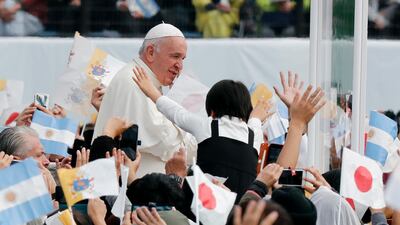Pope Francis called on Sunday for world leaders to abandon nuclear weapons during a visit to Nagasaki, one of two Japanese cities that was hit by atomic bombs in the Second World War.
Laying a wreath of flowers at ground zero in memory of the 74,000 victims of the bomb, the pope said the site stood as a reminder "of the pain and horror that we human beings are capable of inflicting upon one another".
"Convinced as I am that a world without nuclear weapons is possible and necessary, I ask political leaders not to forget that these weapons cannot protect us from current threats to national and international security."
The pontiff restated his support for a 2017 treaty to ban nuclear weapons, which failed to win the support of big nuclear powers.
Prior to 2017, the Holy See had not spoken out against nuclear weapons, maintaining for nearly three decades that having such weapons was morally acceptable in the meantime as long as it was used toward mutual, verifiable nuclear disarmament.
"The possession of nuclear and other weapons of mass destruction is not the answer (to longings for peace)," Francis said in the ceremony which was attended by crowds of Japanese Christians despite the wind and rain.
"Our world is marked by a perverse dichotomy that tries to defend and ensure stability and peace through a false sense of security sustained by a mentality of fear and mistrust," he said.
"Peace and international stability are incompatible with attempts to build upon the fear of mutual destruction or the threat of total annihilation."
Francis gave his address near a large print of a famous photograph taken by an American soldier shortly after the 1945 blast, showing a Japanese boy taking his dead younger brother to be cremated.
He said that the money spent on nuclear arms should be used instead on reducing poverty and protecting the environment.
"In a world where millions of children and families live in inhumane conditions, the money squandered and the fortunes made through the manufacture, upgrading, maintenance and sale of ever more destructive weapons, are an affront crying out to heaven," he said.
Francis visited Nagasaki, a key city in Japan’s Christian history, where Christians kept their religion secret for 200 years, as part of a three-day visit to the Asian country. Today Japan has around 440,000 Catholics.
Francis laid a second wreath in memory of 26 Nagasaki Martyrs, who were crucified in 1597 at the start of the two-century wave of anti-Christian persecution by Japanese rulers.
“May we never forget their heroic sacrifice!” Francis said in remarks at the memorial.
The pope travelled to Hiroshima later on Sunday, the site where the first atomic bomb was dropped three days before the attack on Nagasaki, killing at least 140,000 people.
Many of those who survived developed various forms of cancer after being affected by radiation from the blast.
Francis made a speech at a ceremony at Hiroshima's peace memorial in the darkness, declaring possession of nuclear weapons was "immoral".
“The use of atomic energy for purposes of war is immoral,” he said.
He added “As is the possession of atomic weapons.”
“We will be judged for this,” he warned.
Francis' trip to Japan marked his first papal visit to the country and the second by a pope in history after John Paul II in 1981.


